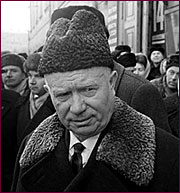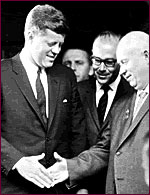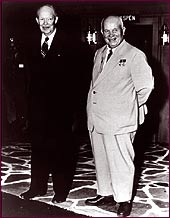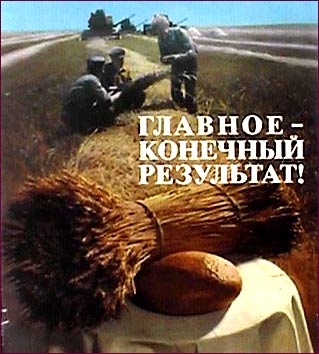 Nikita
Khrushchev Nikita
Khrushchev
A Soviet loyalist and Stalin's trusted heir, Khrushchev
was also responsible for an opening up of the country and "de-Stalinization."
In 1956, as Soviet premier, he denounced his former patron and
set into motion a new freedom. He reorganized Soviet industry,
stemmed the tide of desertions from the Western Communist parties,
soothed the incipient rebellion in Poland and Hungary, and got
from China's Mao Tse-tung a showpiece pledge of allegiance.
After Stalin's death, Stalin's handpicked successor, George
Malenkov, found that nobody wanted him around, now that Stalin
was gone. He only held the post of secretary general for nine
days before he stepped down to become premier, giving the top
post to a junior politburo member, Nikita Khrushchev.
Three months later police chief Beria tried to seize
power for himself; he was arrested by army sentries and executed.
Nikita Khrushchev was born in 1894 to a small farmer
in the Ukraine. He only had three years of formal schooling
and struggled to make ends meet as a miner and locksmith until
he joined the Communist Party in 1918.
Khrushchev's interest in agriculture was not misplaced
because the annual harvests had been exceptionally poor in
recent years. Stating that "the agricultural sector"
had become a major bottleneck for economic progress, Khrushchev
tried to reorganize it along functional, more efficient lines.
To start with, taxes on farmers were reduced and the government
paid more for the food taken from them. Then came what was
called "The Virgin Lands Campaign,"
in which thousands of young peasants were dispatched to Kazakhstan
and west Siberia to plow up arable land there. At first it
was his greatest success: by 1956 the amount of farmland in
the Soviet Union had been increased by 87 million acres, or
50%. Corn, meat and milk production increased so dramatically
that Khrushchev predicted the USSR's total agricultural production
would overtake that of the United States by 1970. Those successes
made Khrushchev very popular, and encouraged him to make sweeping
changes in other areas as well.
 During
Khrushchev's first three years it seemed that Stalin still
controlled the Soviet Union from the grave. His monuments
were visible everywhere; everybody in the government was there
because he stayed in Stalin's good graces; and only 12,000
of the five or six million prisoners that were still living
in the Gulag had been freed. The Twentieth Party Congress
in February 1956 seemed to continue this trend when it opened
with a tribute to the late "Great
Leader and Teacher." But on the last day,
after the routine work was finished, Khrushchev suddenly convened
an extraordinary session that no foreigners were allowed to
attend. For the next four and a half hours he stunned the
world by giving a passionate speech that denounced Stalin's
personality, methods and policies with words that only the
most virulent anticommunists would use, calling him a "criminal
murderer" and a "purveyor
of moral and physical annihilation," among
other things. He denounced the mass purges, calling all of
the cases fabrications that crippled the country's leadership
just before World War II began. He questioned Stalin's policy
toward minorities and his rigid centralized planning of the
economy. During
Khrushchev's first three years it seemed that Stalin still
controlled the Soviet Union from the grave. His monuments
were visible everywhere; everybody in the government was there
because he stayed in Stalin's good graces; and only 12,000
of the five or six million prisoners that were still living
in the Gulag had been freed. The Twentieth Party Congress
in February 1956 seemed to continue this trend when it opened
with a tribute to the late "Great
Leader and Teacher." But on the last day,
after the routine work was finished, Khrushchev suddenly convened
an extraordinary session that no foreigners were allowed to
attend. For the next four and a half hours he stunned the
world by giving a passionate speech that denounced Stalin's
personality, methods and policies with words that only the
most virulent anticommunists would use, calling him a "criminal
murderer" and a "purveyor
of moral and physical annihilation," among
other things. He denounced the mass purges, calling all of
the cases fabrications that crippled the country's leadership
just before World War II began. He questioned Stalin's policy
toward minorities and his rigid centralized planning of the
economy.
"Politicians are the same all
over. They promise to build a bridge even where there is no
river." - Nikita Khrushchev.

 A
wave of de-Stalinization followed the secret speech. The
ethnic groups deported by Stalin to Siberia/Central Asia were
immediately returned to their homelands. The political prisoners
were freed, though not all were rehabilitated. Stalin's victims
in the Red Army, like Marshall Tukhachevsky, were posthumously
rehabilitated. Most of Stalin's pictures and statues disappeared
from public places. In 1961 his remains were removed from
a place of honor beside Lenin and buried outside Lenin's Tomb;
that year also saw the five cities named after Stalin renamed.
But by discrediting Stalin, Khrushchev had also destroyed
the myth that Soviet leaders were the infallible interpreters
of Marxism-Leninism. He had unknowingly cast doubt on the
legitimacy of all future leaders. If a sadistic monster could
rule Russia for three decades and claim to be following Marxism
correctly, how reliable could the system be? Russians learned
for the first time to question authority, and the political
dissidents that have been a part of Russian life since the
1960s got started as a result of the secret speech. A
wave of de-Stalinization followed the secret speech. The
ethnic groups deported by Stalin to Siberia/Central Asia were
immediately returned to their homelands. The political prisoners
were freed, though not all were rehabilitated. Stalin's victims
in the Red Army, like Marshall Tukhachevsky, were posthumously
rehabilitated. Most of Stalin's pictures and statues disappeared
from public places. In 1961 his remains were removed from
a place of honor beside Lenin and buried outside Lenin's Tomb;
that year also saw the five cities named after Stalin renamed.
But by discrediting Stalin, Khrushchev had also destroyed
the myth that Soviet leaders were the infallible interpreters
of Marxism-Leninism. He had unknowingly cast doubt on the
legitimacy of all future leaders. If a sadistic monster could
rule Russia for three decades and claim to be following Marxism
correctly, how reliable could the system be? Russians learned
for the first time to question authority, and the political
dissidents that have been a part of Russian life since the
1960s got started as a result of the secret speech.
As the 1950s ended and the 60s began, Khrushchev was
at the height of his career, popular at home and feared abroad.
But while Khrushchev was enjoying his successes, his mistakes
were catching up with him. It has been said that Khrushchev's
downfall was caused by three words beginning with the letter
"C": China, Cuba, and Corn.
Mao Zedong, Chineese leader at the time, regarded Stalin
as a teacher and never approved of de-Stalinization.

|
|
|

Soviet poster - "The End Result
is what's important".
|

|
|
The thawing of Soviet-US relations in the late 50s
was followed by a series of tension-raising incidents in the
early 60s: the capture of an American spy plane pilot, Soviet-US
rivalry for influence in the new nations of the Third World,
an unsuccessful invasion of Cuba by US-backed guerrillas,
and a world crisis caused by the building of the Berlin Wall
in 1961. But the most dangerous event was the placing of Soviet
troops and missiles in Cuba in 1962. Never did the two superpowers
come closer to starting World War III than they did here.
Khrushchev blinked first and removed the missiles when the
USA promised not to invade Cuba again. The troops stayed,
but the Soviet Union took an enormous blow to its prestige.
While all this was going on, the Soviet economy deteriorated.
The agricultural situation was especially bad, with harvests
in 1959 and 1960 that were far less than expected. At the
22nd Party Congress in October 1961, Khrushchev unveiled a
vast twenty-year plan to revolutionize agriculture. The success
of the "Virgin Lands" campaign made him set extremely
high goals for this plan: grain output was to double, milk
to triple, and meat to quadruple. He especially encouraged
the growing of corn, ordering farms to cultivate that more
than anything else. It was a disaster; the seeds, fertilizer,
machinery, silos and experience needed were just not there.
Bad land management caused the topsoil of the Virgin Lands
area to be blown away, turning Kazakhstan into a dustbowl,
and old agricultural regions like the Ukraine fell into neglect
as manpower and machines were poured into Central Asia. To
prevent starvation Khrushchev was forced to buy 6.5 million
tons of grain from Canada and Australia in 1963, the first
of the many grain purchases in recent Russian history.
Khrushchev's style of leadership and his blunders made
him a national embarrassment; the most notorious example came
during a 1960 UN speech, when he got so mad that he banged
his shoe on the podium! The last straw was Khrushchev's announcement
that he would divide the Communist Party in two and place
the two halves under an agricultural and an industrial bureau,
a move that gave him more power at the expense of other bureaucrats.
The Politburo voted to expel him a second time in October
1964, and this time the Central Committee voted against him
too. Khrushchev lost his job, but not his head; he lived in
comfortable obscurity until he died of natural causes in 1971.
Khrushchev is remembered for many things, but most of all
he was the only Soviet leader to leave Russia a better place
than it had been under his predecessor.
|

|
Links
More about Khrushchev on www.cnn.com,
the
rise of Khrushchev, interview
with Khrushchev's son, article
"The Andropov Hoax". (in English).
|
|
|



